
Ryu Final: It’s Tiger Awesome!
February 26th, 2009 Posted by Gavok | Tags: akuma, crimson viper, ryu, sagat, seth, street fighter, sub-zero, Video GamesI’ve always been a fan of the Street Fighter games and their stories. With the sudden resurgence of the series with its kickass new videogame and horrible, horrible new movie which I will unfortunately see on opening day because it probably won’t be in theaters anymore by Saturday, I’ve been checking out a lot of the comic-related stuff. While UDON has three different Street Fighter comics coming out at the same time (Street Fighter II Turbo, Street Fighter IV and a Chun-Li miniseries), I decided to give the manga Ryu Final a look.


I’m not usually a manga guy, but we had it at work and I wanted to give it a shot because it takes place during the course of Street Fighter III. I love the SF3 games and they never get any play. They always appear neglected by Capcom and a lot of the fans, such as the lack of any of its characters in SF4. I should also bring up the bizarre and confusing ordering of the game series’ canon. Some games replace others in continuity, even when they appear to be sequels. By the end of it, it looks like this:
– Street Fighter
– Street Fighter Alpha 2
– Street Fighter Alpha 3
– Super Street Fighter II Turbo
– Street Fighter IV
– Street Fighter III: Second Impact
– Street Fighter III: Third Strike
All while sharing the same universe with Final Fight, Rival Schools and Saturday Night Slam Masters.
Ryu Final takes place during Third Strike, the latest entry in terms of continuity. It follows Ryu, piecing together nearly all of his character interactions and the game endings that relate to him. A run-in with Ken ends with Ryu defeated and questioning why he even fights in the first place. Soon after, he meets with a crazy 150-year-old man named Oro who soundly defeats him and forces him under his wing as his new apprentice. The two of them wander the world together as Ryu takes on various SF3 characters like Hugo, Yun, Yang and Dudley.
This quest for answers brings Ryu closer and closer to his final battle against his main nemesis Akuma. Which reminds me that the manga is completely worth reading just for a flashback sequence that shows Ryu’s origin. Long story short, a younger Akuma saves a very young Ryu’s life by jumping out of the shadows in a cave, punching his fist THROUGH the back of a bear’s skull and stopping with his fist inches from Ryu’s face. The manga does well in adding more dimension to the Akuma character, even including an odd Killing Joke moment of laughter between Ryu and Akuma before their fight.
For me, it all boils down to how awesome Sagat is. For those who play the games, you’re probably wondering what the hell Sagat has to do with anything. He wasn’t in any of the SF3 games. As far as the canon goes, Sagat and Ryu agreed that Ryu would seek out Sagat when he was ready for them to have their true, clean fight. So during SF3, Sagat is just chilling out in Thailand. In this book, Ryu does meet up with him as to fulfill his promise of a rematch and the entire thing is totally sweet.
But there’s another part that’s great involving a flashback. We go back to see Sagat after SF1’s conclusion. Ryu had sucker-punched Sagat and gave him a huge, bloody wound on his chest in a major upset. Sagat’s top pupil has lost faith in him and Sagat has lost faith in himself. He responds to his loss by tearing apart trees in rage.
Then he finds that he almost crushed a kid during this. The boy is laying there, horribly wounded and half dead. A doctor finds that the wounds were caused by a tiger mauling him. There are poachers out there who will force children to act as decoys for the sake of catching their prey. Hearing about this, Sagat races into the jungle.
“What am I doing?! Am I going to defeat the poachers to avenge the young boy…?! NO!! I merely want to avenge my own honor… That is all I fight for! This has nothing to do with compassion… This is about making myself feel better! What a petty man I am! But… I don’t care! No one can stop me now!!”
There are two hunters going after a giant tiger. One gets mauled to death. Sagat steps in and stares down the tiger until it leaves. The surviving poacher is grateful, but Sagat calls him out on exploiting the children. He begins to slap the shit out of the guy repeatedly while bitching him out. His chest wound is still fresh and the pain kicks in again, causing him to hesitate and allowing the poacher to escape into his camp. The poacher brings out a little girl and holds a gun to her head, saying that he’ll let her go if Sagat forgets this night ever happened.
The wounded little boy from earlier shows up and yells at him to stop.
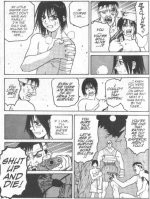
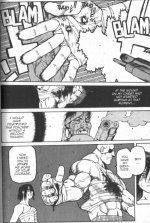
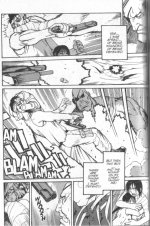
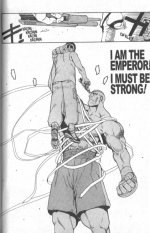
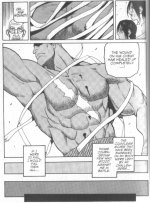
After the flashback, we see that these two siblings have grown up to be farmers who are loyal and close to Sagat. Sagat rules so very much.
But yeah, Ryu Final is worth a try if you’re riding the SF4 high. The UDON Street Fighter stuff isn’t bad either, now that it’s coming out regularly again, but I noticed a big problem in Seth’s plan in the first Street Fighter IV issue:
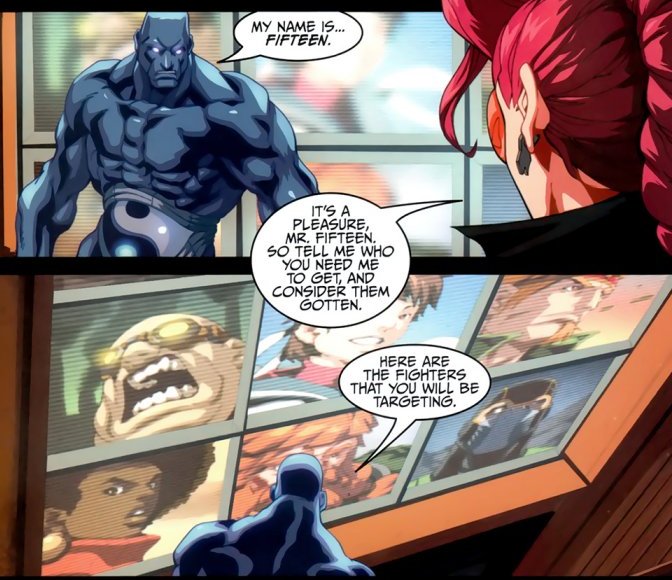
Don’t do it! That guy in the bottom right beat up Batman and can tear your spine out! Wait, never mind. I forgot that I hate Crimson Viper. Forget I said anything.










